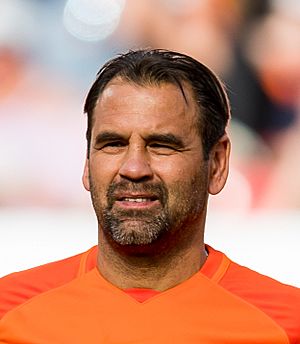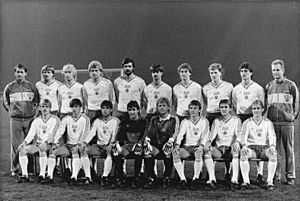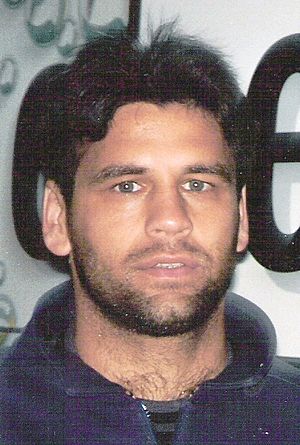Ulf Kirsten facts for kids

Kirsten in 2019
|
|||
| Personal information | |||
|---|---|---|---|
| Date of birth | 4 December 1965 | ||
| Place of birth | Riesa, East Germany | ||
| Height | 1.72 m (5 ft 8 in) | ||
| Position(s) | Striker | ||
| Youth career | |||
| 1972–1978 | BSG Chemie Riesa | ||
| 1978–1979 | BSG Stahl Riesa | ||
| 1979–1983 | Dynamo Dresden | ||
| Senior career* | |||
| Years | Team | Apps | (Gls) |
| 1983–1990 | Dynamo Dresden | 154 | (57) |
| 1990–2003 | Bayer Leverkusen | 350 | (181) |
| Total | 504 | (238) | |
| International career | |||
| 1984–1986 | East Germany U21 | 10 | (4) |
| 1985–1990 | East Germany | 49 | (14) |
| 1990–2000 | Germany | 51 | (20) |
| Managerial career | |||
| 2003–2005 | Bayer Leverkusen (assistant) | ||
| 2005–2011 | Bayer Leverkusen II | ||
| *Club domestic league appearances and goals | |||
Ulf Kirsten, born on December 4, 1965, is a famous German former professional football player. He was a powerful striker, known for scoring many goals. People sometimes called him Der Schwatte, which means 'The Black One' in a local German dialect. Ulf Kirsten made history by being the first player to play 100 international games for two different national teams. He played first for East Germany and then for reunified Germany. One of his biggest wins was the 1992–93 DFB-Pokal (German Cup).
Contents
Club Career Highlights
Playing for Dynamo Dresden
Ulf Kirsten started playing football in 1972 for a local team called BSG Chemie Riesa. In 1978, he moved to BSG Stahl Riesa. Then, in 1979, he joined the youth academy of Dynamo Dresden. Dynamo Dresden was a top football club in East Germany. It was also the most successful club there at the time. Kirsten made his first professional appearance for Dynamo Dresden in the 1983–84 DDR-Oberliga season.
He played 154 matches and scored 57 goals for Dynamo Dresden in the DDR-Oberliga. He helped Dynamo Dresden win the DDR-Oberliga two years in a row. These wins were in the 1988–89 and 1989–90 seasons. In 1990, Ulf Kirsten was named the Footballer of the Year in East Germany.
Kirsten had a special way of playing. He was not very tall, about 172 cm (5 ft 8 in), but he was strong. This made him have a low center of gravity. It helped him keep the ball away from bigger defenders. He could also turn quickly to shoot from close range. His playing style was often compared to the legendary player Gerd Müller. Even though he was not tall, Kirsten was also very good at scoring with his head.
Time at Bayer Leverkusen
Ulf Kirsten was one of the first footballers from East Germany to join the Bundesliga after Germany became one country again. He played 350 matches for Bayer 04 Leverkusen in the German Bundesliga. He scored 182 goals for them, which puts him among the top goal scorers in Bundesliga history. He became known as one of the most dangerous strikers in the league.
However, Bayer Leverkusen often finished second in the league. They were usually behind teams like Bayern Munich or Borussia Dortmund. Ulf Kirsten stayed with Bayer Leverkusen until he retired from playing in 2003. He also played in the 2002 UEFA Champions League Final, a very important European club competition. His team lost that final to Real Madrid. In the 1999–2000 season, Kirsten won an award called EFFIFU. This award was for being the most effective striker in the league.
Off the field, Ulf Kirsten was known for his strong beard. This even led to him getting a sponsorship deal with Braun. They used him to advertise their electric shavers.
International Football Career

Ulf Kirsten played 100 international games for his country. These games were almost equally split between two teams. He played 49 games for East Germany. Then, he played 51 games for the unified Germany. His international career lasted 15 years, from 1985 to 2000. The unified German team was formed in late 1990.
Kirsten scored a total of 34 goals in international matches. Fourteen of these goals were for East Germany. He played in major tournaments later in his career. Ulf Kirsten represented Germany at the 1994 and 1998 World Cups. He also played in the Euro 2000 tournament.
Personal Life
Ulf Kirsten's son, Benjamin, also became a footballer. Benjamin played as a goalkeeper for Dynamo Dresden and NEC Nijmegen.
Honours and Achievements
Club Success
Dynamo Dresden
- DDR-Oberliga (East German League Champion): 1988–89, 1989–90
- FDGB-Pokal (East German Cup Winner): 1984–85, 1989–90
Bayer Leverkusen
- DFB-Pokal (German Cup Winner): 1992–93
- UEFA Champions League (Runner-up): 2001–02
Individual Awards
- East German Footballer of the Year: 1989–90
- Bundesliga Top Scorer: 1992–93, 1996–97, 1997–98
- UEFA Cup Winners' Cup Top Scorer: 1993–94
- UEFA Cup Top Scorer: 1994–95
- kicker Bundesliga Team of the Season: 1996–97, 1998–99
See also
 In Spanish: Ulf Kirsten para niños
In Spanish: Ulf Kirsten para niños
- List of men's footballers with 100 or more international caps
 | Misty Copeland |
 | Raven Wilkinson |
 | Debra Austin |
 | Aesha Ash |


